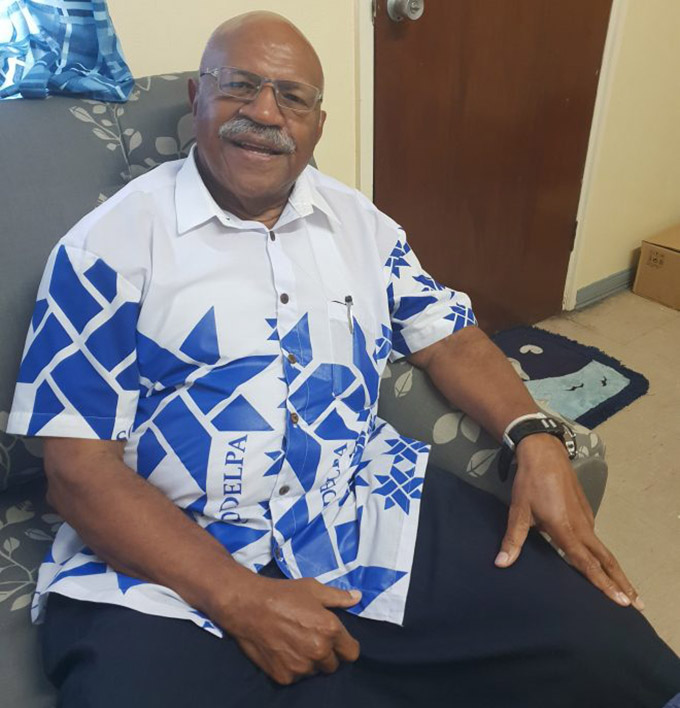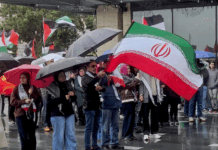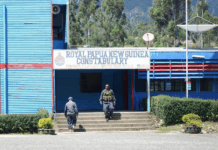
By Sri Krishnamurthi of the Pacific Media Centre
Fiji’s Social Democratic Liberal Party (SODELPA) leader Sitiveni Rabuka is confident of winning government benches in the 2018 general election.
SODELPA, the largest opposition party from the 2014 election in Fiji, currently has 15 seats while FijiFirst has 32 and the National Federation Party has three in a 50-seat Parliament.
SODELPA was established in 2013 after the dissolution of its predecessor, the then ruling Soqosoqo ni Duavata ni Lewenivanua (SDL) party.

“I’m looking at, at least 28 seats, which gives us a majority. I have calculated on the basis of the 18 seats that we held. We won 18 seats but then lost three – two to debt and one to imprisonment,” said the enigmatic leader of SODELPA.
“They were replaced by the next three on the list, but those three only missed out by a few votes because of our total party vote.”
Rabuka, notorious for executing the Pacific’s first coup in 1987, says his party is all geared up for the election and ready to start campaigning.
“We are giving out the party message about consolidating the (indigenous) Fijian institutions – the iTaukei institutions and remembering the Bible,” says the former prime minister.
“It is a long struggle.”
Coalition deal sought
As for strategy, he has tried to do his utmost to get the other parties around the table in a coalition deal to take on the ruling FjiFirst party.
“I tried to form a coalition before the elections but based on the views of their supporters, they preferred not to be seen holding hands with me, so they decided no, we’ll go it alone.”
Rabuka seemed to undergo a change in attitude in the years after his coup. He formed a partnership with the then National Federation Party leader, Jai Ram Reddy, to usher in the more equitable 1997 Constitution.
But ironically, their coalition suffered a humiliating defeat in the 1999 election to the Fiji Labour Party led group.
Rabuka made it clear that a grand coalition with FijiFirst, post-election, is not on the cards and will never be, as long as he remains leader of SODELPA.
“With FijiFirst, we have not considered that, and I will not consider it,” he says as a bottom line.
“We are diametrically opposed in our views,” he says with a stern gaze.
Record of service
And, why should people vote for SODELPA, which is looked suspiciously in some quarters as a nationalist party, unlike FijiFirst, which claims multiracialism as its manifesto?
“We believe we have the record of service, a leadership that listens to the people,” said Rabuka, who was prime minister of Fiji from 1992-1999.
“We have compassionate leadership, and we have the will to do what is right, with malice towards none.”
He has several planks on which to campaign this election, and he outlines them:
“We are going to campaign on social justice, looking after the marginalised, the weak in society; we will continue with the social programmes in the past and spread the national wealth as widely as possible,” he says, reciting his well-practised mantra.
He denies notions that SODELPA is perceived as an iTaukei (indigenous) party.
“Some view us as that, but it is not factual, as we have shown,” he says.
“We are just carrying on what started in the Deed of Cession (1874), where we promote civilisation and Christianity.
Good governance
“We increase industry and trade, and good governance in the interest of the natives, as well as the white population – those are words of the Deed of Cession.
“We continue in the same trend as continued in the colonial days; the Alliance days, the SVT days and the SDL days.”
He vehemently disagrees with the abolition of the Great Council of Chiefs (Bose Levu Vakaturaga), disbanded in March 2012 by current Prime Minister Voreqe Bainimarama.
“It was the wrong thing to do because the universal cry now is for indigenous institutions since the declaration on the rights of the indigenous peoples on December 13, 2007.
“The Great Council of Chiefs (GCC) should be re-established. They have no executive role, but they have a very important mediatory and advisory role.”
As for the claims that the GCC had always tried to be involved in the politics of Fiji, Rabuka admits there is some truth to that accusation.
“They have always tried that. I found that during my time, I had to stand my ground as prime minister and chief executive officer of the government of Fiji.
“I used to say, ‘you are advising me on indigenous matters, on matters of iTaukei, I listen, but I rule in the interest of the nation as a whole’.”
Rabuka has become a consummate politician, a long way from the days when he was third-in-command in the military in 1987, carrying out the orders of the then beaten Alliance government and staging a coup.
Sri Krishnamurthi is a journalist and Postgraduate Diploma in Communication Studies student at Auckland University of Technology. He is attached to the University of the South Pacific’s Journalism Programme, filing for USP’s Wansolwara News and the AUT Pacific Media Centre’s Asia Pacific Report.












































